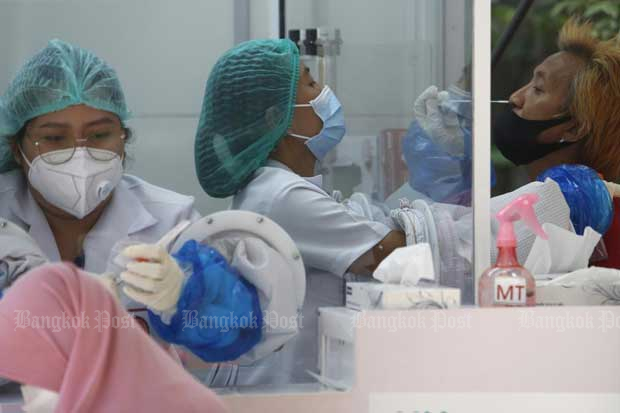
Thais are expected to get locally developed Covid-19 vaccines as a third booster jab next year.
None of the three Thai-made vaccines have yet passed clinical trials. So, they cannot be used to tackle the current wave of Covid-19 outbreak or ease the vaccine shortage problem.
However, researchers behind the domestic vaccine efforts insist their vaccine research and development work can still help long-term efforts to stop Covid-19 and enhance the country's ability to fight such diseases in the future.
The vaccines are Baiya SARS-CoV Vax 1, developed by Baiya Phytopharm Co Ltd, Chula-Cov 19, developed by Chulalongkorn University's Centre of Excellence in Vaccine Research and Development, and NDV-HXP-S, by the Government Pharmaceutical Organization (GPO).
Asst Prof Suthira Taychakhoonavudh, researcher at the Faculty of Pharmaceutical Science, Chulalongkorn University, and CEO of Baiya Phytopharm, said Thais will have more vaccine options from next year once the Thai vaccines have entered the market.
The development of plant-based subunit vaccines by Baiya Phytopharm is one of those efforts.
This type of vaccine is produced by modifying plant protein from the leaves of tobacco trees to resemble the shape of the Covid-19 virus. When the vaccine is injected into the human body, our immune system will react to the modified protein and build up immunity against the Covid-19 virus which has a similar structure.
She said the vaccine has already proven effective in preventing Covid-19 infections in animals.
Baiya Phytopharm's vaccine will still have to complete tests in humans first, before it can be registered and approved for public use.
"We have now reached the stage of human trials, and we will begin with 100 volunteers in August. We expect our vaccines will be ready for general use by next year," she said.
"In the meantime, Baiya Phytopharm is developing a second-generation vaccine to cope with new strains of the virus."

By the time the vaccines are expected to be approved in 2022, many people will have already received their first dose of Covid-19 vaccine, and they will need to get another shot of vaccine to maintain their immunity.
"Our research and development work is not about short-term solutions but the long-term sustainability of Thailand's public health, as our technology can be applied to produce vaccines against other contagious diseases, not just Covid-19," she added.
Prof Dr Kiat Ruxrungtham, head of Chulalongkorn University's vaccine research centre, said the public health sector needs vaccine production technology in place including bases within the country. "Our vaccine development may be too late to solve our immediate problems, but it is important for the country's future and health security to be able to produce our own vaccines," he said.
"We will have the knowledge and facilities to promptly prepare our own vaccines so we will no longer have to rely solely on imported vaccines, in the event of another pandemic."
Thailand could fashion itself into the vaccine hub of Asia. The Chula-Cov 19 vaccine will be the first mRNA vaccine to be developed and produced in Southeast Asia, so Thailand could promote itself as a major supplier of mRNA vaccines in the region.
The Chula-Cov 19 vaccine, he said, will be available at the earliest in the first quarter of 2022 or by the third quarter at the latest. It has to pass human trials and the vaccine approval process of the Thailand Food and Drug Administration.
The Chula-Cov 19 vaccine is an mRNA-type vaccine, similar to the Pfizer and Moderna vaccines, which use messenger RNA or mRNA to teach our cells how to make a protein that triggers an immune response against the Covid-19 virus inside our bodies.
Chulalongkorn University's vaccine research centre has reached a partnership agreement with BioNet-Asia Co Ltd to oversee manufacturing of the vaccines. The first lot of 10,000 doses has been made and will be deployed in the first phase of human trials, starting this month.
Based on tests on monkeys and mice, the vaccine has 100% efficiency after two doses. The researchers are also developing a second generation to cover new strains of Covid-19.
GPO managing director Withoon Danwiboon said development of the NDV-HXP-S vaccine is now in its second phase of human trials. This vaccine could be available early next year. The NDV-HXP-S vaccine is produced by using the inactivated Newcastle disease virus, which has been genetically modified and focuses on a stabilised spike protein of the coronavirus on the surface.
Dr Withoon said the production process is similar to that of the influenza vaccine, which GPO's vaccine factory already makes. That means the mass production of the Covid-19 vaccine can start immediately at GPO's industrial-scale plant with a production capacity of around 25-30 million doses per year.
